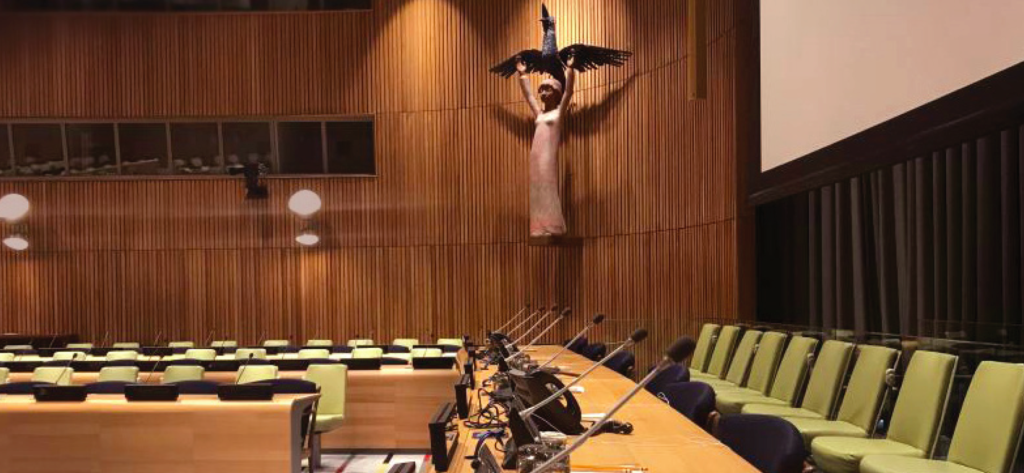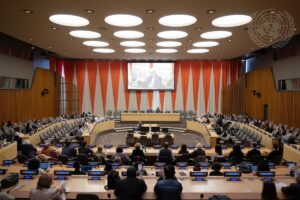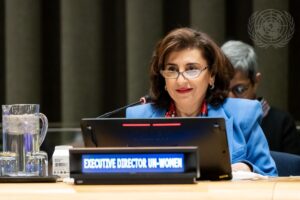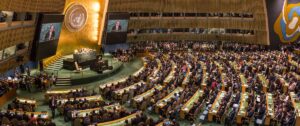Recommendation:
Create a strong UN Peacebuilding Council to replace the current Peacebuilding Commission. Similar to the transformation of the Human Rights Commission into a Council in 2006, it is time for the UN Peacebuilding Commission to be upgraded into a Council with enhanced powers and responsibilities, and mandated to lead on policy development, coordination, resource mobilization, conflict prevention, and peacebuilding efforts not addressed directly by the Security Council.
Global Challenge Update:
Over the past ten years global peacefulness has deteriorated by 3.78 per cent 1Institute for Economics and Peace, “Global Peace Index 2019”. 2. June 2019. and the gap between the most peaceful and least peaceful countries has increased between 2008-2019 (see Figure 1). Violent conflict is the main driver of humanitarian needs, with projections showing that, in 2019 alone, nearly 132 million people will require humanitarian assistance. 2United Nations Office for the Coordination of Humanitarian Affairs. “Global Humanitarian Overview 2019.” 2019, 5. Moreover, the average economic cost of violence for the ten countries most affected by violence was, in 2019, equivalent to 35 percent of their GDP, while the impact of violence on the global economy reached U.S. $1.2 trillion in purchasing power. 3Ibidem, 3 and 58.
Figure 1: Trends in peace: 25 most and 25 least peaceful countries, 2008-2019
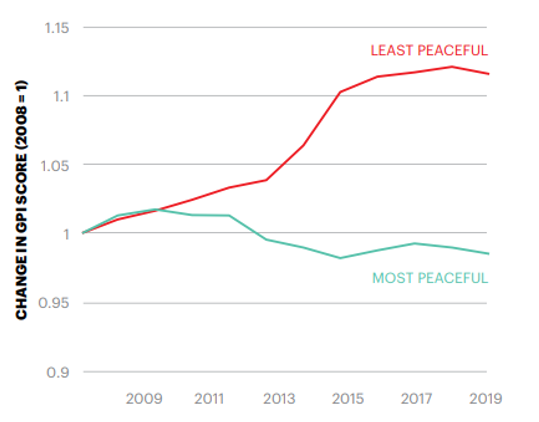
Since 2011, the UN Security Council’s permanent members have cast thirteen vetoes to block action on the Syrian conflict. In contrast, the UN Peacebuilding Commission has made some important strides, including through innovating various engagements with countries emerging from conflict and a flexible and streamlined integrated peacebuilding strategy instrument that aims to better help host countries confront deadly conflict. However, given that it has only an advisory role to the Security Council and General Assembly, the time has come, since the PBC’s creation at the UN60 Summit in 2005, for an important makeover.
Innovation Proposal:
Facing difficulties in improving Security Council representativeness and effectiveness, an empowered Peacebuilding Council would allow more capable UN Member States to contribute directly to the UN’s primary purpose of maintaining international peace. By replacing the Trusteeship Council as one of the six major organs of the United Nations, the upgraded Council would be, in effect, well-placed to lead on system-wide policy development and coordination activities for “second and third-order conflicts” of limited concern to the Security Council. Such an overhaul would enable it to more effectively engender predictable and sustaining financing for peacebuilding too.
Moreover, the enhanced Peacebuilding Council should be entrusted with a conflict prevention mandate operationalized through a new “Peacebuilding Audit” tool, modeled on the Human Rights Council’s Universal Periodic Review (UPR) instrument for tracking the human rights records of all UN Member States. As with the UPR, all countries would participate periodically in such audits of early warning indicators. This would be consistent with current efforts to track the ten targets and associated indicators of all countries’ progress toward meeting their commitments to Sustainable Development Goal 16 (peace, justice, and strong institutions). At the same time, the new PBC would invest most of its time and resources on countries and regions in non- (and especially “post-”) peacekeeping environments, monitoring as well as marshalling collective action to avert the outbreak or recurrence of deadly conflict and tracking closely the UN’s system-wide efforts at sustaining peace.
Strategy for Reform on the Road to 2020 (UN75):
Even without the Charter reform required to replace the Trusteeship Council, an immediate interim goal, in time for the September 2020 Leaders Summit in New York, could be to expand the current Commission’s scope of operations to include prevention and mediation efforts. These efforts could represent initial steps toward establishing the Peacebuilding Council as a principal UN organ which would, not doubt, face initial resistance in some quarters, especially among P5 Member States who might view their authority as being challenged. From a budgetary perspective, the new Peacebuilding Council could absorb all costs associated with the current Peacebuilding Commission and Trusteeship Council, making it cost-effective in relation to the current UN budget. In the near-term, the 2020 review of the peacebuilding architecture could serve as an opportunity to push forward the proposed Peacebuilding Commission upgrade into a Council and to garner yet further political support in the run-up to UN75. Member States and the UN Secretariat are planning consultations with relevant non-governmental entities to review the progress on the implementation of past peacebuilding architecture resolutions. The Security Council is further planning to review the findings and recommendations of the Secretary-General’s forthcoming comprehensive report (on the “continued implementation of resolution 70/262, and progress in the implementation of the recommendations and options contained in his report on Peacebuilding and Sustaining Peace”) and of related stakeholder consultations. 4United Nations. General Assembly, Security Council. Follow-up to the report of the Secretary-General on peacebuilding and sustaining peace. A/RES/72/276- S/RES/2413. April 26, 2018, para. 4. If the modalities set for the review process are inclusive of external stakeholders (i.e. civil society, think tanks, academia, etc.), then the ambition of Member States might be increased to consider the PBC’s upgrade into a Council. This transformation could be announced and included both the recommendations of the peacebuilding architecture review and the UN75 political declaration to be adopted in September 2020.
Notes
- 1Institute for Economics and Peace, “Global Peace Index 2019”. 2. June 2019.
- 2United Nations Office for the Coordination of Humanitarian Affairs. “Global Humanitarian Overview 2019.” 2019, 5.
- 3Ibidem, 3 and 58.
- 4United Nations. General Assembly, Security Council. Follow-up to the report of the Secretary-General on peacebuilding and sustaining peace. A/RES/72/276- S/RES/2413. April 26, 2018, para. 4.

